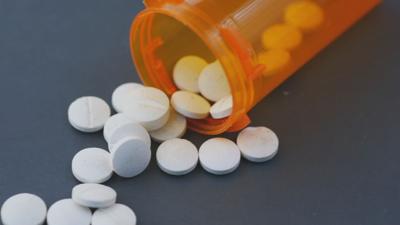LOUISVILLE, Ky. (WDRB) -- Four major opioid distributors will pay Kentucky and Indiana nearly $1 billion to help fight what's become a national crisis.
Under a new settlement, Cardinal Health, McKesson, Amerisource Bergen and Johnson & Johnson will pay Kentucky $483 million and Indiana $507 million. The money will be split evenly between state and local government and used to aid programs to fight the crisis.
If they opt in before July, Indiana communities are eligible to receive a portion of the funding.
“I am pleased that 577 cities, counties, and towns, representing 89% of those eligible, have joined the settlement," Attorney General Rokita said in a news release Friday. "I extend my thanks to them for their leadership on behalf of their communities.
"I extend my thanks to them for their leadership on behalf of their communities. The few Indiana cities that refused to get into the settlement should get into the settlement immediately if a future opportunity presents itself, just as I have publicly advised them for over a year despite being threatened by their attorneys for attempting to communicate directly with them.”
I am proud to share that we won a massive opioid settlement that could bring up to $507 million to Indiana. These funds will help Hoosier communities fight the drug crisis! Read more here: https://t.co/Bhrk3DRjZh
— Todd Rokita (@AGToddRokita) February 25, 2022
Rokita said the money will go toward helping Hoosier communities fight the drug crisis, bolster law enforcement, drug task forces and regional treatment hubs among other programs.
In Kentucky, state leaders said the state is receiving the full funding due to the passing of House Bill 427 in 2021. Under the settlement, the state will be allocated the funds over a period of 18 months.
“This historic $483 million settlement provides the Commonwealth with funds to meaningfully address the effects of the opioid epidemic,” Attorney General Cameron said in a news release. “We’ve fought to ensure that the opioid companies are held accountable for their roles in creating this crisis and that Kentucky receives the funding it is due for the harm these terrible drugs have inflicted upon our neighbors, friends, and loved ones. This funding cannot come quickly enough, and we will continue to work closely with the legislature and local governments to ensure the funds are put toward programs that will stop the cycle of addiction and help heal our communities.”
Today, we announced an historic $483 million settlement with opioid companies for their role in exacerbating the opioid crisis. You can watch and listen to the full press conference here: https://t.co/v5MQbpUCef
— Attorney General Daniel Cameron (@kyoag) February 25, 2022
It's still unclear exactly how much communities will get from the funds and which programs will be funded.
Clark County Health Officer Dr. Eric Yazel said working in an emergency room, and for the county, he sees both sides of the issue from treating someone experiencing an overdose to trying to develop programs to prevent them from ever happening.
"Essentially, every family in our county has been affected by this in one way or another," Yazel said. "It's been something that's been a challenge for us for years, and we've been working really hard, just being able to have some resources available is really important."
Yazel said he hopes funding can be used to address the long-term effects of addiction and recovery.
"What we've really worked hard on is what we call the initial phase, which is just to keep people alive," he said. "But then it's once we get people stable and in recovery, helping them transition back into the community with stable housing and job opportunities and things like that."
Yazel said funding would be also well spent on tackling the rise in methamphetamine, saying usage has increased significantly in recent years.
Mike Purdy, vice president of addiction services for Seven County Services, said He's hoping funds can be used to help raise awareness of the common and deadly problem.
"Open your eyes and pay attention, because really it touches all of us," Purdy said. "Part of the stigma, the lie, stigmatization tells you is that, 'This doesn't affect me and too bad for those other poor folks.' No, it affects everyone."
Purdy states need to prioritize spending on programs that normalize the conversation regarding opioid use — and ways to prevent it — at places like college campuses.
"It needs to be well-spent and placed in areas where it can be directly utilized for treatment, not only providing treatment but reducing barriers to treatment," he said.
In addition to the funds, Cardinal Health, McKesson, and AmerisourceBergen will:
- Establish a centralized independent clearinghouse to provide all three distributors and state regulators with aggregated data and analytics about where drugs are going and how often, eliminating blind spots in the current systems used by distributors
- Use data-driven systems to detect suspicious opioid orders from customer pharmacies
- Terminate customer pharmacies’ ability to receive shipments, and report those companies to state regulators, when they show certain signs of diversion
- Prohibit shipping of and report suspicious opioid orders
- Prohibit sales staff from influencing decisions related to identifying suspicious opioid orders
- Require senior corporate officials to engage in regular oversight of anti-diversion efforts
Johnson & Johnson is required to:
- Stop selling opioids
- Not fund or provide grants to third parties for promoting opioids
- Not lobby on activities related to opioids
- Share clinical trial data under the Yale University Open Data Access Project
The money is expected to start reaching state and local governments in the second quarter of 2022.
Copyright 2022 WDRB Media. All Rights Reserved.











